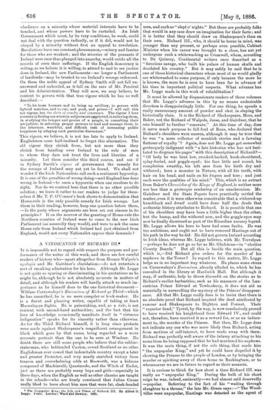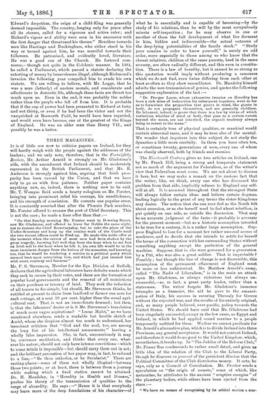A VINDICATION OF RICHARD III.* IT is impossible not to
regard with respect the purpose and per- formance of the writer of this work, and there are few careful readers of history who—apart altogether from Horace Walpole's apologia and Mr. Gairdner's elucidations—do not entertain a sort of sneaking admiration for his hero. Although Mr. Legge is not quite so sparing or discriminating in his quotations as he might be, although he is not absolutely accurate in matters of detail, and although his readers will hardly attach so much im- portance as he himself does to the one historical document— William Cornewaleys'e Enconiizoni of Eichard ye Third—which be has unearthed, be is no mere compiler or book-maker. He is a fluent and pleasing writer, capable of taking at least Macaulay an flights. Be is painstaking, and, as a rule, is not content with second-hand authorities; and the fact that his love of knowledge occasionally manifests itself in "virtuous indignation" speaks for its sincerity rather than otherwise. As for the Third Richard himself, it is long since protests were made against Shakespeare's magnificent arrangement in black which goes by that name, being regarded as a more accurate portrait than the one to be seen at Windsor. No doubt there are still some people who believe that the soldier- statesman, who befriended Caxton, cowed Scotland as no other Englishman ever cowed that indomitable country except a later and greater Protector, and very nearly snatched victory from treason and overwhelming odds at Bosworth, was a hideous compound of Machiavelli. Quasimodo, and the Witch of Endor, just as there are probably many boys and girls—especially in these days, when the English as well as other classics are taught in the schools—who are firmly convinced that Julius Caesar really liked to have about him men that were fat, sleek-headed
• Th. Unpopular King ; the Life and Times of Rickard III. By Alfred 0. Legge. 2 Tole. London: Ward and Downey. 1885.
men, and such as" slept o' nights." But these are probably folks that would in any case draw on imagination for their facts ; and. it is better that they should draw on Shakespeare's than on their own. Richard III., who, it should be borne in mind, was younger than any present, or perhaps even possible, Cabinet Minister when his career was brought to a close, has not yet undergone such a whitewashing as Cromwell, whom, according to De Quincey, Continental writers once described as a "ferocious savage, who built his palace of human skulls and desolated his country." But it may safely be said that he is one of those historical characters whom most of us would gladly see whitewashed to some purpose, if only because the more he is known, the more he is seen to have been far in advance of his time in important political respects. What advance has Mr. Legge made in this work of rehabilitation ?
It must be allowed by dispassionate readers of these volumes that Mr. Legge's advance in this by no means undesirable direction is disappointingly little. For one thing, he spends a really unnecessary amount of powder and shot in slaying the historically slain. It is the Richard of Shakespeare, More, and Baker, not the Richard of Walpole, Jesse, and Gairdner, that he sets himself to further "renovate." At this time of day, does it serve much purpose to fall foul of Bons, who declared that Richard's shoulders were uneven, although it may be true that he was "a mere collector of monkish stories and a fawning flatterer of royalty "? A gain, does not Mr. Legge get somewhat grotesquely indignant with "a late historian who has not hesi- tated to disgrace his pages" with this description of Richard
" Of body he was bent low, crooked-backed, hook-shouldered, splay-footed, and goggle-eyed ; his face little and round, his complexion swarthy, his left arm from his birth dry and withered ; born a monster in Nature, with all his teeth, with hair on his head, and nails on his fingers and toes ; and just such were the qualities of his mind." This, which is an extract from Baker's Chronicles of the Kings of England, is neither more nor less than a grotesque rendering of an anachronism. Mr. Gairdner and the State Papers have practically settled the matter, even if it were otherwise conceivable that a withered-up hunchback and dwarf could have done half the deeds that authentic history attributes to Richard. It is possible that one of his shoulders may have been a little higher than the other, but the hump, and the withered arm, and the goggle-eyes may now be finally dismissed as part of the Ricardian nursery legend. Mr. Legge allows his hero to have had some faults. He was too ambitious, and ought not to have removed Hastings out of his path in the way he did. He did not govern Ireland according to Irish ideas, whereas Mr. Legge believes, with Mr. Trevelyan —perhaps be does not go so far as Mr. Gladstone—in "elective County Boards." But all this is beside the main question, which is,—Did Richard give orders for the murder of his nephews in the Tower ? In regard to this matter, Mr. Legge helps us in no important way whatever. He places some stress on Cornewaleys's Encomium. already alluded to, which he has consulted in the library at Hardwick Hall. But although it may, if authentic, help to throw discredit on the stories as to Richard's earlier barbarities, such as his massacre of the Lan- castrian Prince Edward at Tewkesbury, it does not aid us materially in unravelling the mystery of the Princes' disappear- ance. All that Mr. Legge really does is to insist that there is no absolute proof that Richard inspired the deed attributed. by rumour and Shakespeare to Dighton and Forrest. Their "superior fiend," Tyrrel, by the way, is now conclusively proved to have received his knighthood from Edward IV., and could not, therefore, have received it as a reward for, or as an induce- ment to, the murder of the Princes. But then, Mr. Legge does not indicate any one who was more likely than Richard, acting from motives of self-interest, to have made away with them. Richard was perfectly well aware of the infamy attaching to his name from its being supposed that be had murdered his nephews. It was the main thing, if not the sole thing, that made him "the unpopular King," and yet he could have dispelled it by showing the Princes to the people of London, or by bringing the murder or spiriting away of them home to Buckingham, or to whomsoever we are in future to regard as their assassin.
It is curious to think for how short a time Richard III. was really an "unpopular King." During the bulk of his short reign be was, indeed, eminently—we had almost said deservedly —popular. Referring to the fact of his "wading through slaughter to a throne," the late Mr. Green says :—" The Wood- vines were unpopular, Hastings was detested as the agent of Edward's despotism, the reign of a child-King was generally -deemed impossible. The country, longing only for peace after all its storms, called for a vigorous and active ruler ; and Richard's vigour and ability were seen in his encounter with the first danger that threatened his throne." Merciless towards men like Hastings and Buckingham, who either stood in his way or turned against him, he was merciful towards their followers. He patronised, and evidently loved, literature. He was a good son of the Church. He fostered com• merce,—though not quite in the Cobdenic manner. In 1484, he called a Parliament, which passed a statute declaring the ,extorting of money by benevolences illegal, although Richmond's invasion the following year compelled him to evade his own statute. We are willing to believe, with Mr. Legge, that he was a man (latterly) of austere morals, and considerate and affectionate in domestic life, although these facts are thrust too much upon us. Even in the end, it was probably the nobles rather than the people who fell off from him. It is probable that if the cup of power had been presented to Richard at forty and not thirty, or even if he had been the victor and not the 'vanquished at Bosworth Field, he would have been regarded, -and would even have become, one of the greatest of the Kings of England. He was an abler man than Henry VII., and possibly he was a better.















































 Previous page
Previous page